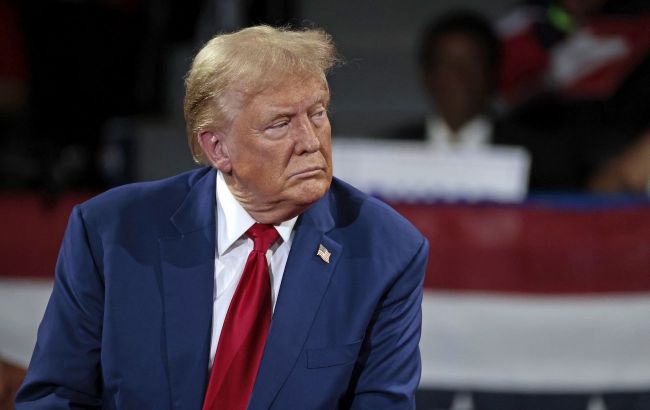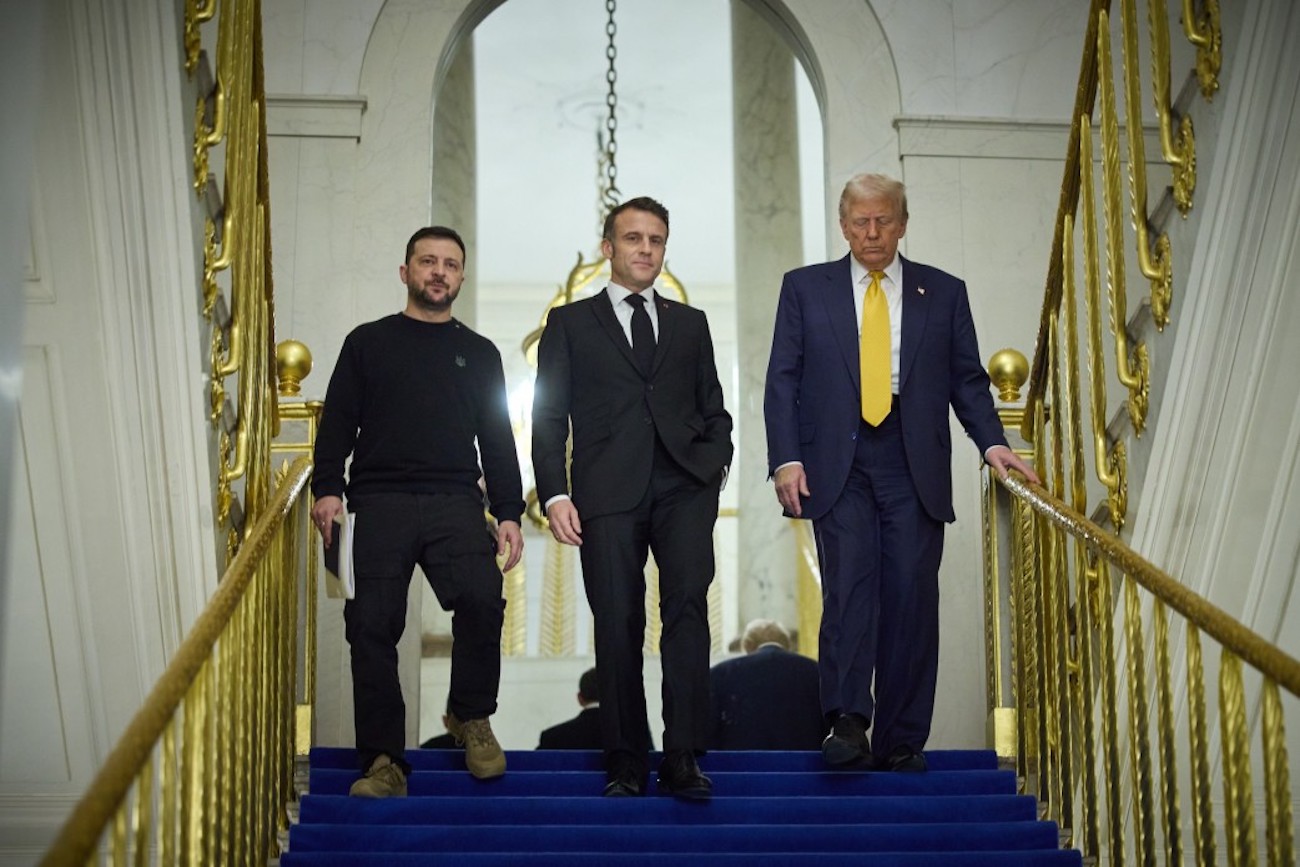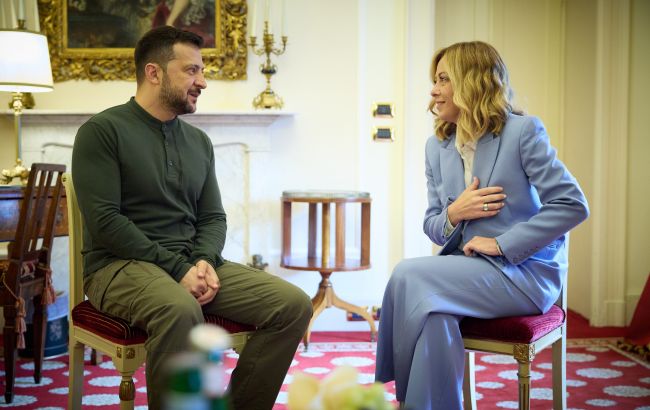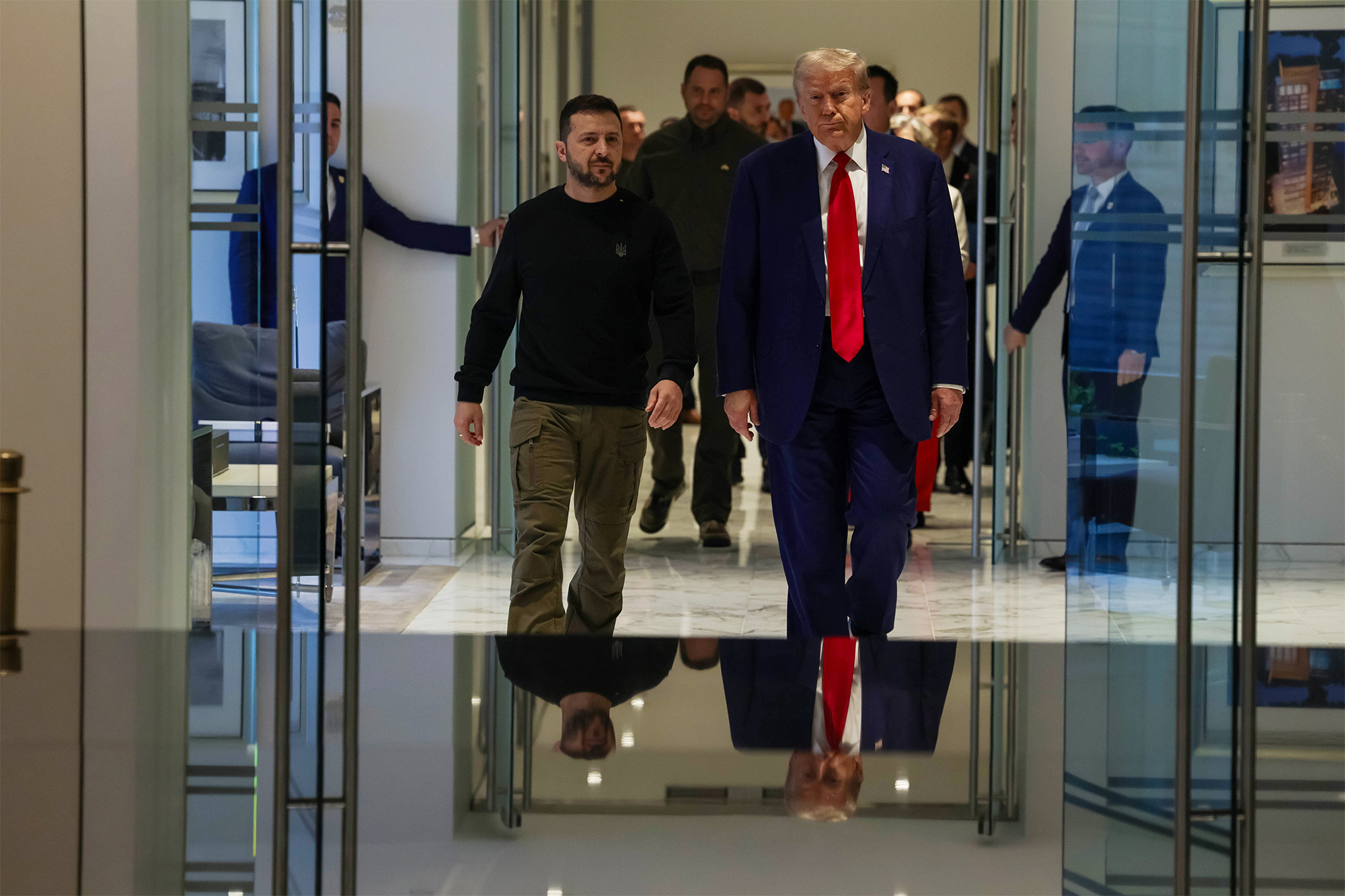Trump era begins: What it means for Ukraine and future of peace talks
 Donald Trump (Photo: Getty Images)
Donald Trump (Photo: Getty Images)
Whether Donald Trump has a peace plan for Ukraine, what problems his team has faced and what its priorities will be, and whether negotiations to end the war will eventually begin – read in the RBC-Ukraine's article.
Contents
- Why Trump has no ready peace plan
- Other priorities of Trump and his team
- Trump’s pragmatic approach
- Possible parameters of Trump’s peace plan
On the morning of November 6 last year, Kyiv time, a new global "X-Day" emerged — January 20, 2025, when Donald Trump will be inaugurated as the 47th President of the United States. Since then, all major global political processes have been divided into “before the inauguration” and “after the inauguration.”
For Ukraine, this has far greater implications than for many other countries. In addition to being Ukraine’s #1 ally in the war, the United States has a decisive influence on Europe’s political direction. Equally important, the US is the key geopolitical player with whom the Kremlin might negotiate.
Trump himself stirred tensions even before his victory, famously promising to “end the war in Ukraine within 24 hours” or even “before officially taking office.” This sparked swift reactions within Ukrainian political circles, where it became a popular narrative that “Trump will end the war soon,” martial law will not be extended, and Ukraine will hold elections by spring.
However, the newly elected US president gradually softened his rhetoric. Instead of resolving the issue in “24 hours,” he began to promise a “quick” resolution, acknowledging the complexity of the “Russian-Ukrainian situation.” Eventually, Trump and his team started discussing a peace settlement in terms of “months.” For example, Trump’s special envoy for Ukraine and Russia, Keith Kellogg, gave himself 100 days to find a “solution.”
Today, X-Day has arrived — Trump officially assumes presidential powers. However, according to sources at RBC-Ukraine, he still does not have a concrete peace plan.
Why Trump has no ready peace plan
Kyiv began engaging with Trump’s team months before the presidential election while maintaining working relations with then-President Joe Biden and Democratic candidate Kamala Harris. Efforts to balance between two rival factions in the US occasionally faltered — such as when Republicans accused Volodymyr Zelenskyy of favoring Democrats. Trump himself kept the suspense alive about whether he would meet with the Ukrainian president while making critical remarks about Zelenskyy.
Ultimately, the two leaders met in New York before the elections and again after, this time in Paris, in the presence of French President Emmanuel Macron.

Zelenskyy, Macron, and Trump at a meeting in Paris on December 7 (photo: president.gov.ua)
Simultaneously, negotiations occurred at the adviser level. Andriy Yermak, head of the Presidential Office, traveled to the US to meet with Trump’s team. In January, Kyiv expected a visit from Keith Kellogg, hoping for concrete progress. However, Kellogg postponed the trip until after the inauguration. According to RBC-Ukraine’s sources, the real reason for the delay was that Trump’s team still lacked a clear vision of how to end the war in Ukraine.
"They have truly realized how complex this issue is," one source noted.
Last week’s developments in the Middle East illustrate how effective US mediation can be when there’s a clear strategy. While Biden’s team made little progress in months of negotiations between Israel and Hamas, Trump’s special envoy, Stephen Witkoff, achieved a breakthrough during a single visit. Despite dissatisfaction from both Israel and Hamas, the parties agreed to a painful compromise.
However, Trump’s team understands that this approach won’t work with Ukraine and Russia. Publicly admitting that promises of a quick resolution were unrealistic is not an option.
According to RBC-Ukraine, there are two main reasons for this. The first is that Trump’s team has begun to realize how difficult it will be for them to negotiate with Kyiv and Moscow.
The Ukrainian leadership continues to defend its subjectivity and the principle of "nothing about Ukraine without Ukraine." Moreover, preparations for potential challenges from Trump’s presidency have been underway. At least for the coming months, Ukraine is secured with finances and, partially, ammunition for the Armed Forces. Assistance from European countries also remains predictable within the framework of security cooperation agreements and other mechanisms.
However, while Kyiv can generally make agreements and act reasonably, the same cannot be said about Moscow. The aggressor country relies on China, which has essentially become its deep rear. Although economic problems in Russia have worsened, its leadership remains far less dependent on public opinion and still can mobilize resources. Evidence of this includes the recent statements by Nikolai Patrushev, a long-time and influential aide to the Russian dictator and a member of Putin’s inner circle, claiming that Ukraine will "cease to exist as a country" by 2025.
The second reason is that Trump’s team — and Trump himself in particular — are deeply concerned about maintaining their “tough guy” image. This is one of the reasons the new US president is so beloved by the MAGA electorate. In the external arena, the "greatness of America," which Trump promises to restore, boils down to the following model: America gives orders, and others comply.
However, in the Russia-Ukraine war, Trump and his team have encountered the reality that this model does not work. Trump will need to sit at the table—quite possibly even a round table — with other participants in the conflict, engage in discussions, present arguments, and negotiate. This does not align with the image of a "tough guy" who commands everyone.
Moreover, the new American administration cannot afford to appear weak at the beginning of Trump’s presidency — neither globally nor in front of its electorate. Thus, it is clearly pausing and refraining from swift decisions or bold moves. This uncertainty also explains the lack of concrete plans for new meetings between Trump and either Putin or Zelenskyy.
Additionally, Trump’s team has plenty of other concerns.
Other priorities of Trump and his team
The well-known story about Trump’s desire to buy Greenland or annex Canada is just a small part of the US foreign policy agenda. There’s also domestic policy, which is inherently more important to the American public.
In an interview with Axios, White House Chief of Staff Susie Wiles stated that the first two years — up until the next midterm congressional elections — will be key for Trump. In the US, the legislature is renewed every two years: the House of Representatives entirely, and a third of the Senate. Currently, Republicans control all levers of power in the country and plan to use this time as efficiently as possible.
Trump plans to sign about a hundred executive orders on his first day as president. Their contents can reveal a lot about his priorities in office and where he plans to focus most of his attention.
Specifically, Trump plans to repeal several executive orders issued by his predecessor, Joe Biden, which allowed hundreds of thousands of migrants from certain countries to enter the US on humanitarian grounds and receive work permits. He also wants to withdraw the US from the Paris Climate Agreement and the World Health Organization and may impose trade tariffs on several countries. Additionally, Trump plans to pardon participants in the January 6, 2021, Capitol riot.
Most of these orders pertain to US domestic policy, which has limited significance for Ukraine.
Another notable detail is that Senate hearings began in the US last week to approve Trump’s cabinet. During these hearings, Secretary of Defense nominee Pete Hegseth, in his opening remarks, identified the main priorities as containing China and managing relations with allies in the Indo-Pacific region, without mentioning Ukraine or Russia. Senators had to ask Hegseth about this, though without much success precisely.
Of course, Trump’s team includes a variety of people. The business-oriented wing, led by Elon Musk, largely takes a skeptical view of Ukraine. However, the good news is that these individuals will not be directly involved in managing the Russia-Ukraine war as part of their official duties. Elon Musk and Vivek Ramaswamy are expected to head the newly created Department of Government Efficiency. Howard Lutnick will lead the Department of Commerce, Scott Bessent the Department of Treasury, and Peter Thiel is not slated to take on any official role.
The most vocal commentator on international politics is Elon Musk. However, according to Ukrainian diplomat and former Foreign Minister Volodymyr Ohryzko, Musk is likely to eventually focus on the area assigned to him by Trump — enhancing the capacity of the US government apparatus. Those who will hold official positions responsible for foreign policy in Trump’s administration present a more favorable situation for Ukraine.
"His entourage, which is now being formed, is competent and experienced. They understand that the approach of a bull in a china shop is detrimental to both the bull and the shop. So, I think they will guide him toward a middle trajectory, one that follows the defined framework of every American president," Ohryzko said in a comment to RBC-Ukraine.
At the aforementioned Senate hearings, the nominee for Secretary of State, Marco Rubio, addressed Ukraine, though his remarks were ambiguous. On one hand, he acknowledged that Ukraine would not be able to forcibly expel the occupiers, even to the borders of February 23, 2022. He also emphasized that compromises will ultimately need to be made by the aggressor country and Ukraine. Of course, any negotiations to end the war will inherently involve some concessions from Kyiv. However, when such a statement is made so clearly, publicly, and in front of US senators, it is not a particularly encouraging message for Ukraine.
At the same time, Rubio stated that it is crucial to avoid a recurrence of Russian aggression in 4–5 years, saying, "This is not a scenario anyone here would prefer."
Under Trump’s leadership, according to Rubio, "the main priority of the State Department will be the United States," and he identifies the primary threats as coming from China, Russia, North Korea, and Iran. Rubio’s Cuban heritage also suggests he will take a more active role in Latin America, focusing on countering China’s influence and addressing migration issues. Already, Trump has staked claims on the Panama Canal and strained relations with several countries in the region, where he plans to deport illegal migrants.
Trump's pragmatic approach
Amid these conditions, a global "brainstorming" is taking place among leaders of major countries, heads of international organizations, diplomats, and advisors.
"Everyone is nervous and trying to pitch ideas to Trump through their initiatives," a diplomatic source told the agency.
Regarding Ukraine, this includes ideas about peacekeepers and expedited funding for Ukraine under the guarantees of frozen Russian assets. However, according to multiple RBC-Ukraine sources, discussions about peacekeepers are still at very preliminary stages. There is no clarity on their number, their deployment areas in Ukraine, or — most importantly — their mandate and objectives. A few battalions of French and British troops stationed in barracks near Lviv are a far cry from the same battalions positioned near the frontlines in Donbas.
As for the frozen Russian funds in Europe, it is evident that the following approach will likely prevail: Russia will not get them back, but Ukraine will also not receive them for military purposes just yet — these funds may only be allocated for post-war reconstruction.
Ukraine has noticeably intensified its contacts with European partners to present a unified voice in talks with Trump. In recent weeks, this was evident during President Zelenskyy’s meetings with Polish Prime Minister Donald Tusk in Warsaw, British Prime Minister Keir Starmer in Kyiv, and especially with Italian Prime Minister Giorgia Meloni in Rome. Meloni stands out due to her close relationship with Trump, rooted in ideological alignment and a longstanding connection.


Volodymyr Zelenskyy and Giorgia Meloni (Photo: president.gov.ua)
Here, multiple avenues are evident. The first involves the pragmatic interests of the United States as a state and of American businesses.
"Trump reasons a lot in terms of benefits and costs. I'm not sure that he weighs them well, but you know, he thinks that he thinks in those terms. So it's very important for Ukraine to show to Trump that Ukraine can give something to the United States and that the United States gain out of a non-Russian victory," said Stefano Braghiroli, an associate professor of European studies at the University of Tartu (Estonia), in a comment to RBC-Ukraine.
Representatives of Ukrainian authorities, who have had recent contacts with Republicans, have emphasized that, compared to Democrats, Republicans generally approach issues with far greater pragmatism.
Through various channels, European leaders are trying to cement the idea that the continuation of the war benefits America’s primary rival — China. This viewpoint is already supported by part of Trump’s circle, including the aforementioned Marco Rubio. On the other hand, Elon Musk and some tech billionaires are lobbying for a more moderate stance on China due to their business interests.
"If Trump wants to go down in history as a great leader, he must avoid losing. And if he makes concessions to Putin, that would be a 100% loss. Trust me, Trump is not in America forever. Democrats remain and will capitalize on every wrong move he makes. In that case, his vision of making America ‘great again’ will turn into fiction," former Ukrainian Foreign Minister Volodymyr Ohryzko emphasized in a conversation with RBC-Ukraine.
Given Trump’s highly personalized approach to addressing state matters, his character traits are bound to play a significant role in any potential future negotiations regarding Ukraine.
"It’s important to understand certain features of Trump’s worldview. Incidentally, he described them quite well in his autobiography The Art of the Deal. One principle he follows in deal-making is ‘hit back.’ This means that Trump initially engages with people from a presumption of trust. But when he sees that someone is trying to deceive him, he responds very decisively, relying on strength," said Oleksandr Merezhko, head of the parliamentary committee on foreign affairs, in a comment to RBC-Ukraine.
According to Merezhko, this situation might arise when Trump realizes that Putin is not interested in peace and is attempting to deceive him. This scenario is actively being discussed in European circles as well.
Possible parameters of Trump's peace plan
Thus, Ukraine enters the Trump era without a clear understanding of how the new American leader plans to end the war, as even his team lacks this clarity. Numerous articles in Western media discuss possible and impossible approaches Trump might take toward the Russia-Ukraine war, speculate on timelines for the start and conclusion of negotiations, and meetings at the highest levels. However, RBC-Ukraine sources within the Ukrainian government, who are involved in contacts with the new U.S. team, treat these speculations cautiously.

Zelenskyy at a meeting with Trump in New York (Photo: Getty Images)
At present, only two important parameters seem to be more or less emerging, which Trump's team might eventually present during negotiations. The first is that the issue of Ukraine's NATO membership in the foreseeable future will be taken off the agenda. However, it is unlikely to be taken off permanently. "The NATO topic will be taken off the table but not thrown into the trash — it will simply be put in a drawer," one RBC-Ukraine source described the situation.
The second point involves freezing hostilities along the line that will have de facto formed on the ground at the time of a ceasefire. This condition is openly viewed in Kyiv as a bad one. After all, it fundamentally fails to resolve the issue of Russian aggression and the restoration of Ukraine's territorial integrity. Moreover, as the experience of the JFO (Joint Forces Operation) in Donbas demonstrated, any such freeze can turn into active hostilities at any moment. And now, the line of contact will be many times longer than it was during 2014–2021.
Additionally, most speculations about "Trump’s actions regarding Ukraine" often overlook a fundamental issue — the aggressor country's willingness to end the war. For now, there is no indication of such willingness, not even remotely. Russian forces continue their offensive in Donbas and are not planning to stop voluntarily.
While Kyiv holds out hope that the war can be concluded in 2025, work is simultaneously underway on an alternative scenario — maximally strengthening the army and preparing for the continuation of the war. This task will remain relevant in the Trump era.
Sources: Axios, Reuters, Washington Post, NPR, Fox News, and comments from Stefano Braghiroli, Volodymyr Ohryzko, Oleksandr Merezhko, and RBC-Ukraine sources within the Ukrainian government.

